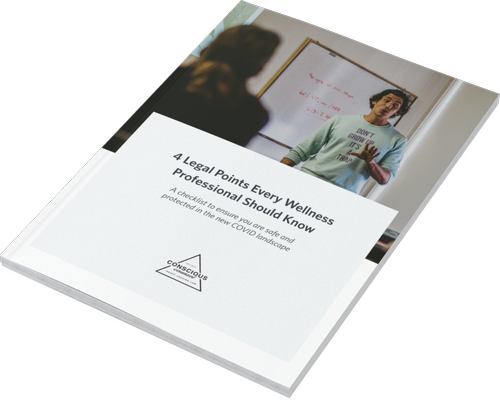3 Must-Know Facts about Waivers of Liability
If you’ve ever stepped into a yoga class, signed up to climb a rock wall, or registered for a gym membership then you’ve almost certainly signed a waiver of liability. Waivers protect the company, or instructor, from being sued if you gets injured. This post will explain what a good waiver does, discuss enforceability, and share some cautionary tales about yoga studio waivers.
Are Waivers Actually Enforceable?
In short, usually yes. They might not be enforceable if they make you sign your rights away before receiving essential services, like treatment at a hospital, or if they are intentionally confusing. Courts decide if a waiver is enforceable when a client sues the company. Different states have different law about enforceability, so it is important to consult a legal professional when crafting yours.
What Makes a Good Waiver?
A waiver is “good” when it protects you from liability. To protect yourself as much as possible your waiver should:
- Be super clear and readable. Your clients should actually read and understand your waiver. Using short sentences and simple words will help.
- Acknowledge the risks of the activity. Might your clients sprain a wrist? Get overheated? Stretch too far? Contract ringworm? Have a freak stroke out of nowhere? Spell out those risks to your clients. Sugarcoating the risks only hurts you later on.
- Be specific to your jurisdiction. Different states have different laws about what does and doesn't fly. What is “too vague” in Vermont might be A-Okay elsewhere. This is a prime reason not to download waivers off the Internet. Instead hit up your favorite legal professional for help.
Write What You Mean, and Mean What You Write
Here are two cases where a studio owner didn't fully understand their waivers, and they had to settle with (re: pay) their students. First, Margaret Black* was taking a chair class during her yoga teacher training. She was carrying her chair to put it away after class when a studio employee took it from her. When the employee grabbed it, the chair hit Margaret’s head and resulted in a concussion. Second, Dee Sestito* was in a yoga class when the instructor gave her a much-too-powerful assist in a seated forward fold. Dee yelled for the instructor to get off, but she was already injured.
Both students sued their studios, and then both studios told the courts “Hey, she signed this release so her injury is on her.” However, the first court found that the release Margaret signed only covered the studio from being sued for injures during class. Since she was injured after class, the studio is liable for her injury. The second court found that Dee’s release only covered the studio in cases where a student caused their own injury. Because Dee’s injury was caused by the instructor’s carelessness, Dee was in the right.
What’s Next?
First, read your waiver!!! What does it say? Do you understand it? Second, ensure that every single client signs it. Last, consult a lawyer who knows your industry and your jurisdiction to review your waiver. If you don’t have one, or don’t have one that you understand and feel confident using please reach out.
Still confused?
Keep your brand safe and protected with Conscious Counsel
Get your free industry-specific checklist and workbook

Chat With Us
We love helping entrepreneurs protect their brands,
grow their businesses and lead with their hearts!

CONSCIOUS COUNSEL LAW CORPORATION
206-12 ATHLETES WAY
VANCOUVER BC
V5Y 0B5 CANADA